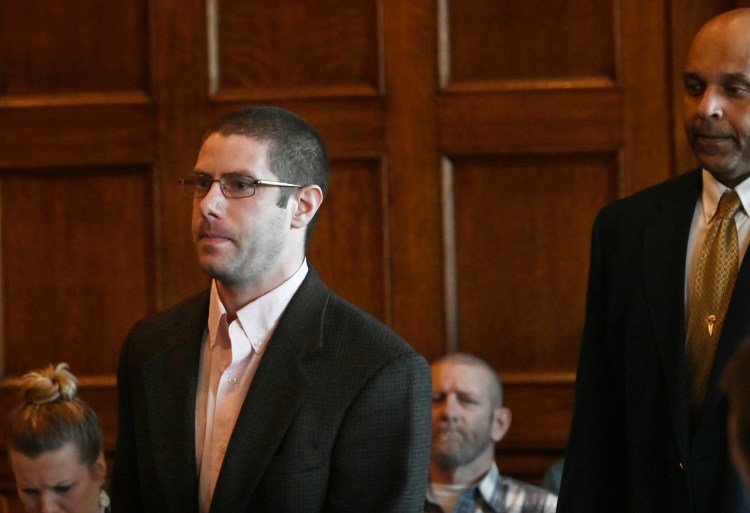John D. Williams would later say he inhaled drugs like he breathed air.
By the time he was 29, he had been using for nearly half of his life. Selling drugs was his sole source of income. He preferred crack cocaine and sometimes heroin.
He used every day, every few minutes, even minutes before he shot and killed Cpl. Eugene Cole last year.
Forensic psychologist Dr. April O’Grady detailed that drug use on the witness stand Friday during the fifth day of Williams’ trial on a murder charge in the death of the Somerset County sheriff’s deputy. Williams said in court Friday that he will not testify in his own defense.
O’Grady was one of two competing experts who testified Friday about how those drugs impacted Williams’ ability to think and reason in the early hours of April 25, 2018. Their testimony about state of mind could be key to the jurors.
The state has said Williams intended or at least knew he would kill Cole when he pulled the trigger that night in Norridgewock, a critical element to a murder charge. But the defense has argued Williams was too impaired by his drug use to think on that level, and his attorneys will ask the jury to consider a lesser but included offense of manslaughter, which would mean he acted negligently or recklessly to cause Cole’s death.

Cpl. Eugene Cole
The possible sentence for murder is 25 years to life, while manslaughter is capped at 30 years.
Cole, 61, was the first Maine police officer fatally shot in the line of duty in three decades. Williams, now 30, was arrested outside a remote Fairfield cabin on the fourth day of a massive manhunt. He has pleaded not guilty.
The two experts who testified about Williams’ drug use Friday disagreed about whether he acted in a rational or logical way on the night he shot Cole.
The defense presented a videotaped deposition from Dr. John Steinberg, a Maryland addiction physician who reviewed the records in the case, including the initial police interview and medical records.
Steinberg said Williams was using so much cocaine that he had not slept in days, and both drugs and fatigue would have impaired his mind. He pointed to his escape as an example of his irrational thinking. When he fled the scene of the shooting, Williams grabbed 30 grams of cocaine and two grams of heroin, but nothing that would help him survive in the woods.
“If he were thinking rationally and assuming he didn’t want to surrender, he wanted to escape, he could have used his resources and his time to formulate a rational escape plan,” Steinberg said. “But he was unable to do so.”
Deputy Attorney General Lisa Marchese argued with Steinberg about what Williams intended to do when he shot Cole – to simply escape, or to kill.
“If you pull out a gun, you point a gun at somebody and if you pull the trigger, you intend the consequences, in that he wouldn’t be arrested and he would kill Cpl. Cole,” she said. “You intend those consequences, whether they are rational or irrational.”
“That was really complex, so I’ll – let’s focus on the word ‘consequences,'” Steinberg said. “I agree it’s an intentional act. He didn’t accidentally pull the trigger.”
“Right,” Marchese said.
“Now, did he intend the consequences?” Steinberg continued. “He intended the consequence of Trooper Cole is no longer going to take him into custody and he will be able to flee and use drugs. Did he go to the second consequence, which apparently occurred to him as he was driving away and called (his friend) and said, ‘Look what I did, now I’m really dead, I’m completely screwed.’ Did he intend that consequence when he pulled the trigger? I would argue no.”
Marchese then called O’Grady, who evaluated Williams for the state forensic service. O’Grady interviewed Williams several weeks after the shooting and said he had a clearer memory of that night than she expected with his significant drug use. She suggested Williams had developed a high tolerance for the drugs he was using, and he was still able to set goals and achieve them in logical ways.
Williams told O’Grady that he wanted to get his girlfriend out of jail, and he wanted to protect his friends and family from violence by his drug supplier. He made a plan to record a confession that would take responsibility for the drugs that got his girlfriend arrested and then commit suicide. She said he was putting that plan into action the night Cole approached him at his friend’s home in Norridgewock.
“He told me that his goal was not to be caught, and that was the reason for his actions,” said O’Grady, who is the director of psychological services for the University of Maine.
She also saw different signs than Steinberg did in his escape. O’Grady testified that his decision to steal Cole’s truck was logical because he needed a way to get away from the scene, and his decision to go into the woods without food was logical because he intended to kill himself.
She said his decision to shoot Cole was goal-directed, even if it was a poor one.
“Are you telling me that if a person goes to a bar and gets hammered and then has the goal of getting home, then it is rational for them to drive home?” defense attorney Verne Paradie said. “Is that a rational decision?”
“Rational for them at the time,” she said.
Superior Court Justice Robert Mullen sent the jury home shortly after noon Friday. He then asked Williams if he had decided to testify in his own defense. Williams stood to answer him.
“I would like to exercise my right to remain silent,” he said.
The attorneys will likely make their closing arguments to the jury Monday.
Comments are not available on this story.
Send questions/comments to the editors.


